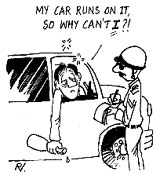One for the road
One for the road

ethyl alcohol or ethanol, which is produced by the fermentation and distillation of sugar derived directly from crops like molasses and from agricultural residues, can be used as a premium liquid fuel to supplement the use of petroleum-based fuels in vehicles. A blend of 20 per cent ethanol and 80 per cent petrol can be used in cars without modifying the engine. In this mix, alcohol acts as an octane booster and ethanol acts as a high producer of power.
Ethanol does not have any greenhouse effect and, when mixed with petrol, it can achieve reductions in carbon monoxide emissions of 10-30 per cent depending on the vehicle's fuel system and the emission control technology. When mixed with diesel, this reduction can be as high as 50 per cent with the added benefit of reduction in soot emissions associated with burning diesel.
At 21.2 mega joules per litre, ethanol has approximately two-thirds the energy value of an equivalent volume of petrol. Hence, a petrol-ethanol mix containing 10 per cent ethanol by volume, will have 3.3 per cent less energy per litre than petrol. However, the fact that ethanol is an octane enhancer will offset this disadvantage, meaning that the fuel will burn more efficiently.
As India has abundant biomass reserves, alcohol as an alternative transport fuel is a viable option. According to L N Batra, general secretary, All India Distillers Association, India has the capacity to produce 2,824 million litre of alcohol annually. Trial projects with alcohol fuel in Andhra Pradesh, Delhi and Gujarat, conducted by the Dehra Dun-based Indian Institute of Petroleum and sponsored by the ministry of non-conventional energy sources, has revealed that there is a 33 per cent reduction in visible smoke emission when blends containing 12-15 per cent ethanol are used.







